Easter 1992 letter, continued
![]() The present, acute housing
shortage in Germany made it impossible to find a place to stay in Bremen, slated to be our next
filming location. Luckily we had signed a contract with Giessen University. I was able to stay
for the month of March 1991 at the Giessen university guest house, hoping during that time to find
a room or apartment in biking distance to the university library. I completed the inventory cards
used to identify the
Giessen manuscripts for the
photographer, and filming began 5 March. Early in my second week at the guest house, however, I
suffered my bicycle accident.
The present, acute housing
shortage in Germany made it impossible to find a place to stay in Bremen, slated to be our next
filming location. Luckily we had signed a contract with Giessen University. I was able to stay
for the month of March 1991 at the Giessen university guest house, hoping during that time to find
a room or apartment in biking distance to the university library. I completed the inventory cards
used to identify the
Giessen manuscripts for the
photographer, and filming began 5 March. Early in my second week at the guest house, however, I
suffered my bicycle accident.
The Accident
I was riding my bike from the guest house to the Catholic student center and had slowed down to make a left turn at a busy six-lane intersection where the traffic light was out of order, and construction sites obstructed both sides of the road. I had my left arm out to signal a turn when a young man just coming off the Autobahn legitimately passed me on the left, but apparently did not see my outstretched arm. I got knocked off the bike and could only just lie there in the road -- in shock and pain because of a dislocated shoulder.
Eventually the driver came back to help me to the side of the road. Later die Polizei arrived, and a Red Cross ambulance took me to the local Catholic hospital, a half block from my intended destination. After what seemed a very long time, the anesthetist showed up and the head surgeon, who happened to be on emergency duty that night, reset my shoulder and kept me overnight in a hospital bed.
The worst part, however, was the several-month-long recovery. A vigorous Polish therapist, my "Mistress of Pain," put me through some gruesome exercises. The first day she said, "Sie dürfen schreien (you may/are allowed to scream)." Scream I did, but thanks to her efforts I ended up with full movement in my left arm and shoulder!
Nine months later, days before I left Germany, the insurance company for the driver's rented automobile finally offered a settlement of DM 1200 (ca. $740), twice my total hospital, therapy and bike-repair costs -- such low medical expenses are unbelievable in the USA, but possible in Germany where the society as a whole has democratically decided that affordable medical costs for all are a benefit they want in the republic. When I got back to Collegeville I was allowed to use some of the money to buy a small TV.
Return to Frankfurt
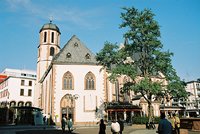 In April the Capuchins graciously
allowed me to return to their
Liebfrauen Kloster in
Frankfurt.
Until the completion of the Giessen project in October, I commuted several
days a week by underground, train and bus -- a journey of about one and three
quarter hours door to door.
In April the Capuchins graciously
allowed me to return to their
Liebfrauen Kloster in
Frankfurt.
Until the completion of the Giessen project in October, I commuted several
days a week by underground, train and bus -- a journey of about one and three
quarter hours door to door.
My fluency in German was very useful when I accompanied the business manager of Liturgical Press, founded by Saint John's Abbey in 1926, for a two-week visit to Catholic writers and publishers in Hungary, Poland and Czechoslovakia.
Eastern Odyssey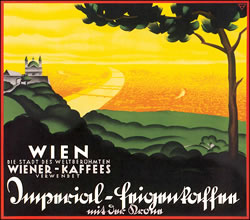
![]() We began our journey 7 September
1991 by driving from Frankfurt to
Melk Abbey which overlooks the Danube near Vienna.
Saint John's
Preparatory School has had an exchange program with the Melk Gymnasium (high school) for over 25 years.
The complex of buildings is a lexicon of baroque architecture and interior decoration. Recent
renovations funded by the Austrian and regional governments in conjunction with the Abbey have made
Melk a major tourist attraction. I stayed overnight in a corner apartment usually reserved for
visiting prelates. Leaving Austria the next day we literally drove around the
city of Vienna on the boulevards of the famous
Ringstrasse.
We began our journey 7 September
1991 by driving from Frankfurt to
Melk Abbey which overlooks the Danube near Vienna.
Saint John's
Preparatory School has had an exchange program with the Melk Gymnasium (high school) for over 25 years.
The complex of buildings is a lexicon of baroque architecture and interior decoration. Recent
renovations funded by the Austrian and regional governments in conjunction with the Abbey have made
Melk a major tourist attraction. I stayed overnight in a corner apartment usually reserved for
visiting prelates. Leaving Austria the next day we literally drove around the
city of Vienna on the boulevards of the famous
Ringstrasse.
![]() Our first business stop was elegant
Budapest. There we heard for the first time a story
that was to become quite familiar.
Our first business stop was elegant
Budapest. There we heard for the first time a story
that was to become quite familiar.
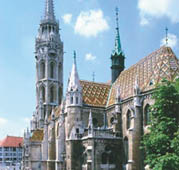 Most of the
Catholic publishers we visited had been in
existence for only a little over a year. We were often referred from one publisher to another with
the notification that they had known each other in prison.
Most of the
Catholic publishers we visited had been in
existence for only a little over a year. We were often referred from one publisher to another with
the notification that they had known each other in prison.
The countries we visited were all caught up in a major turnaround. While Catholic publishers had once to be content with samizadt (underground, mimeographed) works or the few "officially" approved titles a year produced after running a bureaucratic gauntlet of Kakfaesque proportions, they now had all the editorial freedom they could use, but skyrocketing costs and limited resources of paper and materials set different constraints.
To simplify greatly, although the Church was severely suppressed in Hungary by an active Ministry of Atheism, the difficulty of the Hungarian language for the Soviets (Hungarian is not a Slavic language) allowed a certain space for an independent albeit underground expression of ideas.
Czechoslovakia is taking the most radical steps to remove former Communist officials from any influence in the present, and the highly organized Polish Catholic Church and Solidarity provided alternative and transitional structures. The Church in Poland, however, will probably never again be as strong as it was under the Communists.
![]() On the way from
Cracow, a beautiful walled medieval city, to Warsaw, we
stopped briefly at Jasna Gora to visit the shrine of
Our Lady of Czestochowa. Sadly, the
gilded cover was in place over the miraculous icon, and I did not get to see it; nevertheless, we
were edified by the devotion of the numerous pilgrims.
On the way from
Cracow, a beautiful walled medieval city, to Warsaw, we
stopped briefly at Jasna Gora to visit the shrine of
Our Lady of Czestochowa. Sadly, the
gilded cover was in place over the miraculous icon, and I did not get to see it; nevertheless, we
were edified by the devotion of the numerous pilgrims.
 Although we experienced both rainy and bright warm September weather in
Warsaw, I was struck
by the comment of an Australian woman we met who said she very much lamented that she had not seen
the sun, moon or stars in the three years she had been there. Warsaw was shrouded continuously in
smog-like cloud -- Eastern Europe is an environmental and ecological nightmare!
Although we experienced both rainy and bright warm September weather in
Warsaw, I was struck
by the comment of an Australian woman we met who said she very much lamented that she had not seen
the sun, moon or stars in the three years she had been there. Warsaw was shrouded continuously in
smog-like cloud -- Eastern Europe is an environmental and ecological nightmare!
One of the most moving experiences for me was our visit to Niepokalanow where the superior gave us a tour of the museum dedicated to the memory of the Conventual Franciscan martyr, Saint Maximilian Maria Kolbe, who had volunteered to take the place of a fellow prisoner, a layman sentenced by the Nazis at Auschwitz to death by starvation.
![]() Perhaps
even more beautiful than Budapest was
Prague, a
textbook of architectural history. On Valentine's Day, 1945, the US Army's 8th
Air Force mistook Prague for Dresden and dropped a three-minute carpet of bombs
on the city that had until then escaped a major air raid. Arriving ca. 10 p.m., we experienced a little unpleasantness looking for the
historic Hotel Paris when a uniformed official
Perhaps
even more beautiful than Budapest was
Prague, a
textbook of architectural history. On Valentine's Day, 1945, the US Army's 8th
Air Force mistook Prague for Dresden and dropped a three-minute carpet of bombs
on the city that had until then escaped a major air raid. Arriving ca. 10 p.m., we experienced a little unpleasantness looking for the
historic Hotel Paris when a uniformed official
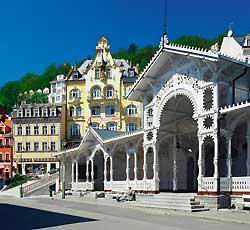 stopped our car, asked for my papers and then dangled my passport over a sewer seeking a bribe for having been intercepted driving the wrong
way on a one-way street -- he settled for two packs of Marlboros, not interested in the box of
Polish Catholic literature on the back seat.
Otherwise the entire trip was without any such incident.
stopped our car, asked for my papers and then dangled my passport over a sewer seeking a bribe for having been intercepted driving the wrong
way on a one-way street -- he settled for two packs of Marlboros, not interested in the box of
Polish Catholic literature on the back seat.
Otherwise the entire trip was without any such incident.
Before leaving the Czech Republic we stopped at
Karlovy Vary (Karlsbad) where the crowned heads of
Europe had come to gamble and take the healing waters. It was named for the
Bohemian king and German and Holy Roman emperor Charles (Karl) IV who allegedly
found the hot springs in 1358 during a hunting expedition.
Southern Sites
![]() My successor,
Father Aelred Tegels OSB, arrived
from Collegeville shortly before I left for central and eastern Europe. When I returned we rented
a car to visit sites in southern Germany where librarians had expressed some interest in having
their collections microfilmed, but no contracts had been signed.
My successor,
Father Aelred Tegels OSB, arrived
from Collegeville shortly before I left for central and eastern Europe. When I returned we rented
a car to visit sites in southern Germany where librarians had expressed some interest in having
their collections microfilmed, but no contracts had been signed.
 We stayed at an inn across from the palace in Sigmaringen, seat of the Catholic branch of the
Hohenzollern family. That Sunday afternoon we visited
Beuron Archabbey which had been founded in 1858 by
Princess Katherina von
Hohenzollern-Sigmaringen. I renewed my acquaintance with
the prior/librarian, Pater Theodor and introduced Father Aelred. The prior reiterated his
willingness to have Beuron's few manuscripts microfilmed.
We stayed at an inn across from the palace in Sigmaringen, seat of the Catholic branch of the
Hohenzollern family. That Sunday afternoon we visited
Beuron Archabbey which had been founded in 1858 by
Princess Katherina von
Hohenzollern-Sigmaringen. I renewed my acquaintance with
the prior/librarian, Pater Theodor and introduced Father Aelred. The prior reiterated his
willingness to have Beuron's few manuscripts microfilmed.
Monday morning we had an appointment at the palace with Herr Peter Kempf, Hofbibliothekar (court librarian). Herr Kempf and Father Aelred hit it off very well, and they discussed the possibility of filming the Beuronese manuscripts at Schloss Sigmaringen or vice versa.
On the way to Freiburg im Breisgau we stopped for an appointment in Donaueschingen, source of the Danube River and seat of the Princes of Fürstenberg, another Catholic, princely family. Since 1283, when the family acquired the right to erect a brewery, Fürstenberg beer has been among Germany's finest. The court library has been significant since the 16th century, and the archivist generously showed us some of the collection's more spectacular items. Father Jonathan Fischer OSB and I had visited there in 1987, but negotiations to film this important collection have as yet been unsuccessful. [Since this writing, the court library has been dissolved.]
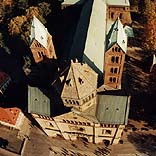 Father Aelred and I spent two nights at the Collegium Borromaeum in Freiburg im Breisgau and inspected the Holy Roman Emperors' superbly renovated cathedrals at
Speyer and
Worms on the way back to Frankfurt.
Father Aelred and I spent two nights at the Collegium Borromaeum in Freiburg im Breisgau and inspected the Holy Roman Emperors' superbly renovated cathedrals at
Speyer and
Worms on the way back to Frankfurt.
The HMML project sustained a severe blow when Herr Badde announced he would be leaving our employ as photographer at the conclusion of the filming in Giessen. Understandably, Karl-Heinz was beginning to tire of almost eight years with no fixed abode, and we were both experiencing more and more difficulty finding temporary lodging in a crowded Germany that lacks almost two million apartments at the present time.
After the Giessen project ended in October 1991, Father Aelred and I moved north to
Damme near Osnabrück where we stayed in a small
Benedictine priory of missionaries from
Münsterschwarzach Abbey. I was very
happy to be living among Benedictines again, and the experience proved helpful in readjusting to
monastic life here at home.
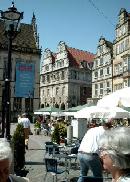 Two of the older priests at Damme had been taken prisoners in north
Africa during WW II and spent the final years of the war at
POW camps
in Texas. Having Americans in the house seemed somehow to rejuvenate them.
Two of the older priests at Damme had been taken prisoners in north
Africa during WW II and spent the final years of the war at
POW camps
in Texas. Having Americans in the house seemed somehow to rejuvenate them.
Eventually, through the intervention of one of the monks, Father Aelred was able to move to a room in the Catholic hospital in Bremen, and I drove a rented 1991 VW Passat 140 km/h three days a week on Germany's busiest highway, Autobahn #1, to help prepare for the next project. In fact, Father Aelred began filming with personnel from Alpha Com, a German microfilm firm, at the State and University Library on 2 January, the same day I flew home from Amsterdam to Minneapolis and thence to Collegeville by car.
To conclude
a brief summary that has gotten way out of line, I returned to a new job as the executive assistant
to the Dean of Admission and VP for Enrollment
Management
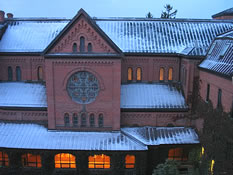 at
the College of Saint Benedict
and Saint John's University. My chief duties lie in the areas of budget, personnel, and publications. I like my
work very much because there is always a variety of tasks on my desk needing attention -- most
pressing right now is the revision of 26 academic departmental brochures for prospective
students.
at
the College of Saint Benedict
and Saint John's University. My chief duties lie in the areas of budget, personnel, and publications. I like my
work very much because there is always a variety of tasks on my desk needing attention -- most
pressing right now is the revision of 26 academic departmental brochures for prospective
students.
I am also very happy to be back in the monastery, and to have a cheery cell on the fifth floor overlooking the central courtyard of the abbey across from the transept of the old church.
Mit freundlichen Grüssen,
Richard osb
1987 * 1988 * 1989 * 1990 * 1991-92 * post-1992